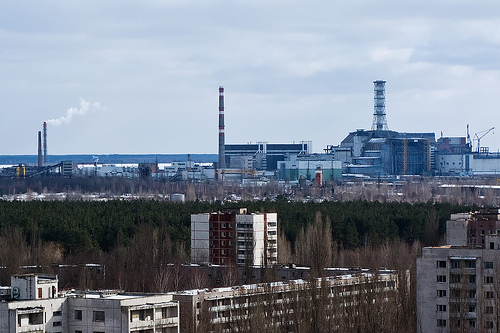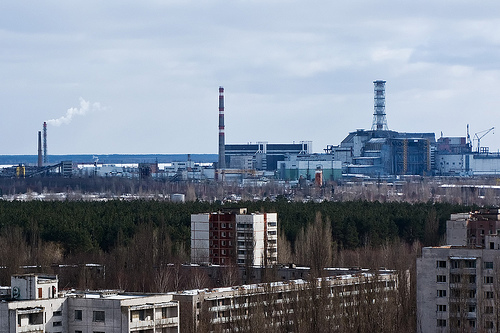 Chernobyl begs a lot of questions 25 years later.Photo: Pedro Moura PinheiroCross-posted from The Guardian.
Chernobyl begs a lot of questions 25 years later.Photo: Pedro Moura PinheiroCross-posted from The Guardian.
Containing the elemental forces that rage inside a nuclear reactor is one of the great achievements of science, but losing control, as happened 25 years ago today at Chernobyl, is one of its greatest failures.
So what to think of nuclear power? People often ask me if I support or oppose the building of new nuclear power stations, presuming that because of my job, I’ll know the answer. If only it were that easy.
Until the disaster at the Fukushima nuclear plant, I would say I was 51 percent in favor, on the basis that we need all the low-carbon electricity we can get to avoid the worst impacts of climate change, and that I tend to trust scientists, having been one.
But 51 percent in favor is a pretty unsatisfactory position — it’s 1 percent off “I don’t know.” Surely I can be more certain than that, I thought.
As the debate has raged, not least between my colleagues George Monbiot and John Vidal, it struck me very clearly that this is not an issue that can be resolved with cold facts alone, for the simple reason that many of the facts are not known. And how do you fairly assess the relative importance of political, economic, security, health, and engineering factors?
The answer, it seems to me, must lie in a series of personal judgements on the critical factors that we all must make for themselves. So I have tried to devise a series of questions which, if you answer based on your own priorities and judgments, should allow you to decide your position on nuclear power.
1. Do you think the global community can prevent the proliferation of nuclear weapons, and, if not, do you think it can prevent a nuclear weapon being used?
The existing non-proliferation regime has slowed but not stopped the spread of nuclear weapons, the ultimate weapon of mass destruction. All recent weapons programs have been developed under the cover of civilian nuclear power. This link has engendered a culture of secrecy in the nuclear industry that worries some.
But perhaps you think there is enough momentum in the current non-proliferation efforts to be more successful. Iran might be considered a test case playing out right now.
But even if weapons spread, only their use would cause catastrophe. Do you think that could happen? Would the threat of devastating retaliation prevent the launch of a warhead anywhere in the world?
2. Is the hazard of climate change greater than that posed by a nuclear disaster?
This is perhaps the toughest question, as the brutal truth is that no one knows the long-term medical consequences of low-dose radiation exposure. Part of that is because identifying small effects over long periods, in the midst of myriad confounding factors, is incredibly hard. Part of it is the shameful lack of resources for those who wished to study the long-term effects of Chernobyl.
The threat posed by climate change, frequently to the most vulnerable in the world, is large, clear, and very likely to come to pass without action. The risk of a nuclear catastrophe is low: It took an earthquake and tsunami of Biblical size to derail Fukushima. But it exists over a very long period of time — decades for operations, centuries or more for waste. Its impact on well-being is largely unknown: Should the precautionary principle apply, or is the danger of global warming too great?
3. Is global political will too weak to create a low-carbon energy future that does not involve nuclear power and in time to avert climate chaos?
If existing nuclear power stations were closed down today, their 13 percent (and falling) of global electricity generation would almost certainly be replaced by dirty coal, which dumps both carbon and radioactive elements into the atmosphere. But if they were phased out, could renewable energy, such as hydroelectricity, wind, and solar, take up the slack? Renewables already have a heavy burden to bear, replacing large loads of coal and gas. But they are no slower to develop than most alternatives and almost certainly faster than nuclear.
Nuclear power is backed by huge companies and states, meaning they heavily outgun smaller, newer renewables companies in lobbying firepower. Crucially, would investment in new nuclear power stations squeeze out investment in renewables?
Another factor to consider is that nuclear power is a mature technology. Renewables are less mature, but offer more growth potential as their cost rapidly falls. Carbon capture and storage (CCS) — completely unproven at commercial scale — offers another alternative. Consider also the fact that electricity demand will rise, but can be slowed by better and highly cost-effective energy-efficiency measures.
So, in a way, this question asks whether political energy is a renewable resource — i.e., will effort expended on building new nuclear power stations mean less effort is available for alternatives?
4. Is nuclear power vital to ensuring the security of energy supply?
Our civilization depends, in much of the world, on energy. Nuclear power offers large amounts of electricity, and is not available only intermittently like some renewables. That steady supply is very useful, but, of course, if the reactors have to be shut down, they leave a very big gap to fill.
Renewables are intermittent, and continent-scale grids (which are starting to be built) and better storage will be needed to balance supplies. But renewables can be distributed more widely and are more resilient to accidents or engineering problems. CCS-enabled coal or gas plants could provide baseload.
Lastly, nuclear power is not truly renewable, and for nations without their own uranium deposits, ensuring access to the fuel is an issue. The sun will always shine and the wind will always blow somewhere.
5. Can the full costs of nuclear truly be calculated?
Nuclear can, in some perfectly reasonable analyses, appear fairly affordable if not “too cheap to meter.” But that usually assumes that the technical problems of the past have been solved in the latest plant designs, which are largely untested at commercial scale. Do you believe engineers have abolished the vast cost overruns of existing generations of reactors? Will the new reactors prevent the accidents, large and small, that pile on costs? Will the temptation to operate plants well beyond their initial design lifetimes be resisted in the future?
An even bigger question is the vast cost of decommissioning and waste disposal. Fully half the budget of the U.K.’s department of energy and climate change will be spent next year on clearing up and storing past waste. And nowhere in the world has a long-term disposal solution been implemented. Under current U.K. plans, it will be at least a century before the radioactive waste from the new reactors planned will be permanently disposed of.
So, do you think these costs will mount to the extent that nuclear becomes expensive compared to other options? The cost of renewables is clearer and there’s no waste to deal with.
So those are the questions I have arrived at. If you have answered “yes” to all or most of them, you are in favor of nuclear power; if you answered “no” to most, you oppose it.
As for me, I find myself giving a clear “no” to questions 1, 4, and 5, a narrow “no” to question 3. and a “yes” to question 2. That makes me pretty firmly against nuclear power, and feeling better about knowing my own mind.



